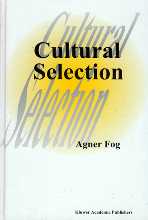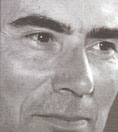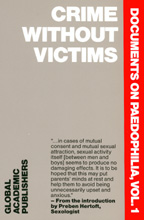|
||||||||||||||
|
|
||||||||||||||
|
On this site you´ll find some of the qualitatively best research on child/adult related sex Among others: 1.) The Sexual Experiences of Children. by Dr. Theo Sandfort, University of Utrecht; In Danish In English: In
Danish:
|
||||||||||||||
The Thought Police
|
||||||||||||||
|
Download previous research free: Bruce Rinds, Robert Bausermans & Philip Tromovitchs (HTML) own presentation report on their research results. You can simply click on their names and print it. Or, just as easily, click on the PDF-icon to your right. Then download and print this PDF-file. This will give you the best print quality available, especially if you want to be sure to get the most complete text! |
|
But if you don´t have the Free Acrobat Reader then you must first click here! |
||||||||||||
| John Money, past-president of the Society for the Scientific Study of Sex | Letters to the American Psychological Association | |||||||||||||
|
|
||||||||||||||
|
Bruce Rind, Ph.D., Department of Psychology Temple University, Robert Bauserman, Ph.D. Department of Health and Mental Hygiene, State of Maryland & Philip Tromovitch, Ph.D. (cand.) Graduate School of Education, University of Pennsylvania, Constantine & Martinson (HTML). Editors of the esteemed anthology “Children and Sex: New Findings, New Perspectives”. Little, Brown & Co., Boston 1981. Edited by Larry L. Constantine & Floyd N. Martinson |
||||||||||||||
|
MINDGLOW MEDIA CATALOG
If you have a discount coupon and/or wish Books Published by MindGlow Media - click here |
||||||||||||||
|
Clash of the Media (HTML)- Authors: Bruce Rind, Ph.D., Philip Tromovitch, M.S., Robert Bauserman, Ph.D. |
||||||||||||||
|
Download: "Clash of the Media" as a PDF-file |
But if you don´t have the Free Acrobat Reader |
|||||||||||||
|
The Politics of Child Sexual Abuse Research (HTML) - Authors: by Sharon Lamb, professor of psychology and clinical psychologist and Janice Haaken, Associate Professor of Psychology |
||||||||||||||
|
Download:
"The
Politics of Child Sexual Abuse Research"
as a PDF-file if
|
||||||||||||||
James Prescott website at http://www.violence.deApropos:
July 19, 2001
IN AMERICA The Thought PoliceBy BOB HERBERTT It didn't matter that the man never wanted anyone else to see the journal, or that the children he fantasized about were entirely fictional. What mattered to authorities in Ohio — the only thing that mattered — was that the thoughts were vile. The fantasies written down by Brian Dalton, who is 22 years old, involved the sexual abuse and torture of children. Mr. Dalton made up names for the children and said they were 10 and 11 years old. This should not be an issue in the United States of America. This is a country in which you ought to be able to write down in private whatever you are thinking, no matter how awful the thoughts. This is not China, or Afghanistan under the Taliban. This is a country in which freedom is supposed to matter. Mr. Dalton, a resident of Columbus, was charged under a state law that prohibits the creation of obscene material involving minors. Such a law sounds reasonable. But the local prosecutor believed (along with others) that the statute covered not only images of real children, but printed or written words involving fictional children. And not only words involving fictional children, but words that were never intended to be shown to anyone. This is as close as it's possible to get — short of ESP — to criminalizing thought. Mr. Dalton had been convicted in a child pornography case in 1998. He served a few months in jail and then was released on probation. His probation officer discovered the journal some months ago during a routine search of Mr. Dalton's home. There was no question that the journal entries were grotesquely pornographic. The prosecutor put the matter before a grand jury, which returned a two-count felony indictment against Mr. Dalton. He pleaded guilty to one count and was sentenced to seven years in prison. And he received an additional 18 months for violating probation. So here we have a fellow sentenced to prison in the United States for merely sitting down and putting his thoughts on paper. "While the thoughts themselves may have been reprehensible and deeply disturbing," said Raymond Vasvari, who heads the American Civil Liberties Union of Ohio, "it needs to be stressed that they were arrived at and recorded in the privacy of this man's home for no one's consumption but his own." Seven years in prison. In America. The fundamental idea behind the criminalization of real child pornography — that is, images of real children engaged in sexual activity — is that the images themselves are the proof that some real child was abused. A real child. Not an imagined child. Ann Beeson, a lawyer with the national A.C.L.U., said she and other First Amendment scholars believed that "the constitutional limit of child pornography laws is in criminalizing the actual exploitation of children, which is important." But beyond that — if only words are involved, or drawings, or images created by a computer with no child involved — "then you no longer have the rationale to suppress it under the First Amendment," said Ms. Beeson. The A.C.L.U.'s president, Nadine Strossen, said she was outraged by the idea that someone could be sent to prison for something he'd written in a private journal. "I think this is completely protected free speech," she said. "I'm just horrified by this case." Ohio's laws regarding minors and sexual activity are not limited to patently obscene material. The state prohibits the creation, reproduction and dissemination of any material that depicts a minor engaged in sexual activity. If you apply that to written materials, as in the Dalton case, then books like Judy Blume's "Forever," Philip Roth's "Portnoy's Complaint" and Maya Angelou's "I Know Why the Caged Bird Sings" would be banned, and their writers and publishers subject to criminal penalties, presumably prison. Sexual hysteria has given the thought police the opening they've craved. Politicians, afraid of being accused of favoring child pornography, will not stand up for that most fundamental of freedoms — freedom of thought.
|
||||||||||||||
|
Part 1-3: Two commentators
on: Egyptologist Paul John Frandsen´s rejection of Universal Incest Taboo - for automatic PlayList - click here |
||||||||||||||
Please
write to JUST-WELL´s webeditor
Troels Peter Schmidt by clicking on Home
below:
|
||||||||||||||




